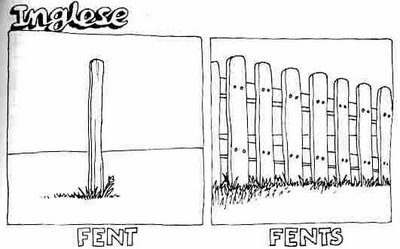Getaway

The above cartoon is by B. Kliban. Isn't it great? It will eventually become sort of relevant, I promise. Well, not relevant, exactly, but...well, you'll see. Maybe.
Jim and I have always been Laurie Anderson fans. We went to Montreal in 1989 (I think--could have been 1990) to see her Strange Angels tour, and our only regret is that we didn't buy tickets for the next night's show as well: total genius. Here's a bit from her massive "United States I-IV":
Lately, I've been doing a lot of concerts in French. Unfortunately, I don't speak French: I memorize it. I mean, my mouth is moving but I don't understand what I’'m saying. It's like sitting at the breakfast table and it's early in the morning and you're not quite awake, and you're just sitting there eating cereal and sort of staring at the writing on the box--not reading it exactly, just more or less looking at the words. And suddenly, for some reason, you snap to attention, and you realize that what you're reading is what you're eating ... but by then it's much too late.
I often think about this when I'm reading the packaging for what I'm eating, which is pretty often, for some reason, that reason being that I'll read anything to hand whenever I get the chance: I've just been a lifelong inveterate reader, and if there isn't a book or a magazine around, then a tissue box or an advertising flyer will have to do.
Last night for supper I had some frozen thing at work, and while I was eating it I was, of course, reading the box: how much sodium is in here? does the description on the front match the food on the plate? how do the French instructions differ from the English? On reading the French instructions for heating the stuff, I discovered that "fente" is the French word for "slit", as in "cut a slit in the plastic to allow steam to escape." (It also occasionally means "slot", depending on the context, but the sense of "long, narrow opening" is still there.)
Doesn't "fente" look like "vent"? It sure did to me, so I made a mental note to look it up when I got home. And what do you suppose? They're completely unrelated!
"Fente" is from French "fendre", the French verb meaning "to open" or "to separate; to split", so that derivation couldn't be clearer. "Fendre" comes from Latin "findere", which is the root of English "fissure" and "fission".
There are two different "vent"s in English. The one which means "the slit in the back of a dress jacket" derives from "fendre"/"findere". The other one, which can be a noun meaning "a means of escape" (as in "steam vent") or a verb meaning "to release" (as in "vent gases" or "vent your feelings"), is related to the identical French word meaning "wind" (the noun, not the verb), since a vent releases wind or other gas. The French word "évent", the direct precursor to our "vent", means "to let out air", because it's the same as "ex-", "out", plus "vent", but "évent" is unrelated to "event" meaning "something which happens"--it's just a coincidence"--because that English word is from Latin "ex"-, "out" again, plus "venire", "to come". (The French for "event" is "événement", in case you were wondering.)
"Fendre", by the way, has nothing to do with English "fender", which is an abbreviation of "defender", since a fender is something which blocks damage. And "fence", as you might have guessed, is also an abbreviation, of "defence" (which Americans usually spell "defense"). "Fent", however, does not exist. Except in that cartoon.

0 Comments:
Post a Comment
<< Home